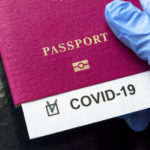 Recent comments from the UK’s scientific community hint that those already infected by the covid-19 virus might have immunity for up to three years, which opens the prospect of them largely living as per normal, providing they can prove this immunity exists. For many, this would involve an immunity passport document that we can carry with us.
Recent comments from the UK’s scientific community hint that those already infected by the covid-19 virus might have immunity for up to three years, which opens the prospect of them largely living as per normal, providing they can prove this immunity exists. For many, this would involve an immunity passport document that we can carry with us.
It’s a process that, whilst logical, is not without obstacles, as a recent paper in The Lancet illustrates. The article, from researchers at Georgetown University, illustrates the practical, equitable, and legal issues associated with such a document.
The authors argue that immunity passports will inevitably create artificial restrictions on who can and cannot participate in various social and economic activities. In a perverse sense, it may encourage people to become infected so that they can return to their normal activities.
“Immunity passports would be ripe for both corruption and implicit bias, and would exacerbate the harm inflicted by COVID-19 on already vulnerable populations,” the author argues.
What’s more, the incentive for seeking out infection might be highest among those who are unable to get appropriate medical care, perhaps due to discrimination or poverty.
Legal challenges
The documents could also face considerable legal challenges, as the International Health Regulations explicitly prohibit health measures that are used to discriminate and impede international travel. As such, many countries may lack the legal framework to offer such passports to citizens as it would inevitably discriminate against those without the document.
“Immunity passports would risk enshrining such discrimination in law and undermine the right to health of individuals and the population through the perverse incentives they create,” the article says.
Perhaps a better way forward would be a vaccination certificate, which is warranted upon the release of a vaccine onto the market. Such a document would provide similar advantages and privileges as the immunity passport, and are permissible under the International Health Regulations.
“Until a COVID-19 vaccine is available, and accessible, which is not guaranteed, the way out of this crisis will be built on established public health practices of testing, contact tracing, quarantine of contacts, and isolation of cases,” the author concludes. “The success of these practices is largely dependent on public trust, solidarity and addressing – not entrenching – the inequities and injustices that contributed to this outbreak becoming a pandemic.”